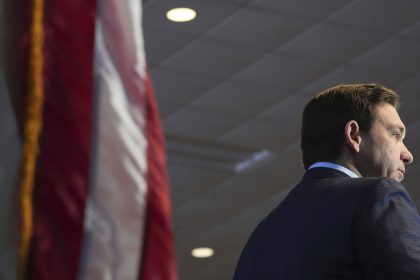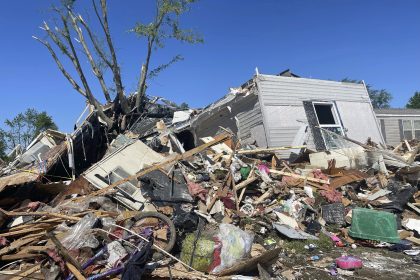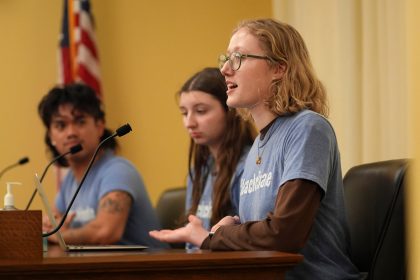SEC Approves Rule Requiring Some Companies to Publicly Report Emissions and Climate Risks

WASHINGTON (AP) — The U.S. Securities and Exchange Commission on Wednesday approved a rule that will require some public companies to report their greenhouse gas emissions and climate risks, after last-minute revisions that weakened the rule in the face of strong pushback from companies.
The rule was one of the most anticipated in recent years from the nation’s top financial regulator, drawing more than 24,000 comments from companies, auditors, legislators and trade groups over a two-year process. It brings the U.S. closer to the European Union and California, which moved ahead earlier with corporate climate disclosure rules.
The rule passed 3-2, with three Democratic commissioners supporting it and two Republicans opposed.
Publicly traded companies will be required to say more in their financial statements about the risks climate change poses to their operations and their own contributions to the problem. But the version approved was weaker than an earlier draft, with changes that weren’t made public until Wednesday’s meeting.
The narrowed rule doesn’t include requirements that companies report some indirect emissions known as Scope 3. Those don’t come from a company or its operations, but happen along its supply chain — for example, in the production of the fabrics that make a retailer’s clothing — or that result when a consumer uses a product, such as gasoline.
Companies, business groups and others had fiercely opposed requiring Scope 3 emissions, arguing that quantifying such emissions would be difficult, especially in getting information from international suppliers or private companies.
The SEC said it had dropped the requirement after considering those comments. Environmental groups and others in favor of more disclosure had argued that Scope 3 emissions are usually the largest part of any company’s carbon footprint and that many companies are already tracking such information.
Commissioner Caroline Crenshaw, a Democrat, voted for passage but called the rule “a bare minimum” that omits important disclosures. She called Scope 3 emissions a “key metric for investors in understanding climate risk” and said investors are already using such information to make decisions.
“Today’s recommendation adopts an unnecessarily limited version of these disclosures,” she said.
Commissioner Hester Peirce, a Republican who opposed the rule, said it would be burdensome and expensive for companies and would trigger a flood of inconsistent information that would overwhelm, not inform, investors.
“However well-intentioned, these particularized interests don’t justify forcing investors who don’t share them to foot the bill,” Peirce said.
The final rule also reduces reporting requirements for other types of emissions, known as Scope 1 and 2. Scope 1 emissions refer to a company’s direct emissions, and Scope 2 are indirect emissions that come from the production of energy a company acquires for use in its operations.
Companies would only have to report those emissions if they believe they are “material” — in other words, significant — to investors — a decision that ultimately allows companies to decide whether they need to disclose emissions-related information. And small or emerging companies don’t have to report emissions at all.
“Climate risk is financial risk. This is a sensible rule to protect investors,” said Elizabeth Derbes, director of financial regulation and climate risk at the Natural Resources Defense Council. “What’s wrong with this rule is that it needs to do much more,” she added. “Investors have been pressing for mandatory disclosure of greenhouse gas emissions, and the agency needs to give them a fuller picture of companies’ risk exposure.”
The final rule will affect publicly traded companies with business in the U.S. ranging from retail and tech giants to oil and gas majors. The SEC estimates that roughly 2,800 U.S. companies will have to make the disclosures and about 540 foreign companies with business in the U.S. will have to report information related to their emissions.
The goal of the rule was to require companies to say much more in their financial statements about the risks that climate change poses to their operations and about their own contributions to the problem. That includes the expected costs of moving away from fossil fuels, as well as risks related to the physical impact of storms, drought and higher temperatures intensified by global warming. The SEC has said many companies already report such information, and the SEC’s rule would standardize such disclosures.
The public comment period for the rule had been extended several times, and SEC Chairman Gary Gensler acknowledged last year that debate over Scope 3 emissions was delaying the final rule, with many observers predicting swift legal challenges.
Some Republicans and some industry groups accused Gensler, a Democrat, of overreach. Their criticism largely centered on whether the SEC went beyond its mandate to protect the financial integrity of security exchanges and investors from fraud.
Gensler said Wednesday that more companies are disclosing such information and both big and small investors are making decisions based on such information.
“It’s in this context that we have a role to play with regard to climate-related disclosures,” Gensler said.
Coy Garrison, an attorney who advises companies on SEC reporting and disclosure requirements, said dropping Scope 3 emissions from the rule was unlikely to deter litigation. He called the rule a vast expansion of disclosure requirements and said the amount of information required and cost to compile it “will continue to raise concerns that the SEC is acting beyond its statutory authority in adopting this rule.”
Suzanne Ashley, a former special counsel and senior advisor to the SEC’s enforcement director and founder of Materiality Strategies, a company that advises companies on issues including regulation, saw it differently.
Ashley said the removal of Scope 3 requirements and other modifications rule put the final rule “squarely within the SEC’s existing statutory authority to require clear and comparable disclosure of information necessary for the protection of investors.”
The SEC rule comes after California passed a similar measure last October that requires both public and private companies operating in the state with more than $1 billion in revenue to report their direct and indirect emissions, including Scope 3. More than 5,300 companies will be required to report their emissions under the California rule, according to Ceres, a nonprofit that works with investors and companies to address environmental challenges. The European Union also adopted sweeping disclosure rules that will soon take effect.
___
The Associated Press’ climate and environmental coverage receives financial support from multiple private foundations. AP is solely responsible for all content. Find AP’s standards for working with philanthropies, a list of supporters and funded coverage areas at AP.org.

























